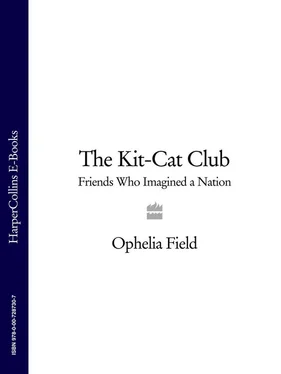1 ...7 8 9 11 12 13 ...35 Addison's friend Steele had more enthusiasm but less opportunity to serve William's government. Steele too wrote an elegy for Queen Mary: ‘The Procession: A Poem on Her Majesties Funeral, By a Gentleman of the Army’. Steele's, however, was not printed by Tonson, but by a lesser firm, probably at Steele's own expense. If Addison and Steele corresponded during these years while following such starkly divergent paths, the letters are lost. Addison seems not to have shared any of his impressive new literary contacts with his former school friend.
Steele had by this time seen active military service in Flanders during 1692–4, for a salary of about 4 shillings (now around £20) a day. Steele had thereby ‘wiped off the Rust of Education’, 38 and depended, as a soldier puts it in one of Congreve's plays, ‘upon the outside of his head [rather] than the lining’. 39 Nonetheless, in the army as in international diplomacy, promotion could be secured by demonstrating literary wit in flattery. As a result of dedicating his elegy on Queen Mary to Baron Cutts, a war hero turned governor of the Isle of Wight, Steele was permitted to switch to the Coldstream Guards, a more elite regiment that provided security at the royal palaces. Steele was made a captain, and, though Cutts was the Guards' nominal commander, much of the actual commanding was left to Steele, especially in early 1697 when he served as Cutts' private secretary. The prospect of a peace to end the War of the League of Augsburg spelled an end, however, to further army promotion for Steele.
Dick Steele would soon prove himself, like Tonson and Prior, an extremely enterprising man, in tune with this enterprising period of British history. This was the legacy of each of these three men's childhood struggles, in contrast to the more complacent confidence of Congreve and Addison—both of whom, despite the forced migrations of the Congreve family and the early death of Addison's mother, came from relatively stable and financially secure homes. Belonging to a club (or a political party) would always be a more primal need for Prior and Steele, both parentless, than for Congreve or Addison. Kindred spirits become far more important than kin if you have fewer kin to begin with.
III THE SCENT OF THE PIE-OVEN
Who knows but by the dint of Kit-Cat's Pies, You may, e'er long, to Gods and Monarchs Rise.
NED WARD, The Secret History of Clubs (1709)
A CONTEMPORARY ACCOUNT by a writer named Ned Ward states that the Kit-Cat Club originally convened at the Cat and Fiddle, a London tavern owned by one Mr Christopher (or ‘Kit’) Cat (or ‘Catling’ 1 ), a pastry cook from Norfolk, whose supposed portrait shows a gnarly man with a white knotted handkerchief on his head. The Cat and Fiddle was on Gray's Inn Lane, a street then noted for its fresh air blowing down from open fields to the north of the city. 2 As a ‘kit’ was slang for a small fiddle, the Cat and Fiddle's signboard, jutting into the lane with its painted emblem of a fiddle-playing puss, may have been a punning reference to the tavern's proprietor. 3
Ned Ward's account describes the meeting of this ‘greasy’ piemaker, Mr Cat, and the ‘amphibious’ publisher-cum-bookseller, Tonson, when they were neighbours in Gray's Inn. Ward envisaged Tonson, his aspiring writers and wealthy patrons gathered sweatily together within the scent of Mr Cat's pie-oven to eat a ‘collation of oven trumpery’—mutton pies, cheese-cakes, golden custards, puff-pastry apple tarts, rose-water codling tarts, and other ornate dishes requiring engineering in dough. As they became drunk, the guests composed doggerel in praise of Mr Cat's pastry creations. The ‘voracious mouth’ of the flaming oven swallowed what they bothered to write down on paper, suggesting it was as near to hand as a spittoon or wastepaper basket. 4
The Kit-Cat Club thus began as an eccentric publishing rights deal, cooked up by Tonson, 5 and has also been called ‘the first expenseaccount publisher's dinner on record’. 6 The publisher ‘very cunningly’ resolved to feed a gang of ‘poetical young sprigs’—including his Fleet Street housemate Congreve—on a regular basis, with Cat's baked goods, provided the poets ‘would do him the honour to let him have the refusal of all their juvenile productions’. 7 Beyond first options on the works of new authors, Tonson wished to forge professional loyalties in the heat of Cat's pie-oven, with an eye to longer-term profits. 8 Ever since Tonson's earliest ventures, he had been securing authors' loyalties through gifts of food and wine—sending exotic melons to Dryden when first wooing the dramatist into his publishing fold, for example—and hiding commercial motives under a veneer of pseudo-baronial hospitality. As early as the 1680s, Tonson had organized what he called ‘Clubbing with Ovid’ 9 —that is, assembling networks of translators to produce collaborative publications. Now he was simply clubbing men in the same way as he had previously anthologized their writings.
The exact date at which the semi-professional friendships between Tonson, his patron-readers (such as Somers, Montagu and Dorset) and his young authors (such as Congreve, Vanbrugh, Prior and Stepney) turned into ‘The Kit-Cat Club’ is unknown, but it was certainly during the final years of the seventeenth century. Thanks to his family's bookshops in the Gray's Inn neighbourhood, Tonson would have frequented the Cat and Fiddle long after moving his own premises from the area. Whereas Tonson's biographers tend to credit him with the foundational love of pies, 10 Somers' biographers claim it was the Lord Keeper who discovered Cat's bakery and took his drinking companion Tonson there one day to taste them. 11
Although there had been clubs in England before, the Kit-Cat Club would be the first to have such wide-ranging interests and in-fluence, combining cultural, political and professional purposes. Previously, trade and craft guilds, political cliques and literary coteries had kept to their own relatively distinct spheres—so, for example, Will's Coffee House had been the venue one evening for Dryden's ‘Witty Club’ and for the politicians' ‘Grave Club’ another. 12
The Kit-Cat Club would draw many of its literary members from the Witty Club, but whereas the Witty Club members were both Whigs and Tories, being a Whig was to be as essential a qualification as wit when it came to joining the Kit-Cat. The republican and Whig clubs of the Civil War and Restoration periods had been notorious as hotbeds of subversion, insurrection and treachery. King William, who relied on the Whigs but ‘believed the Whigs…did not love monarchy’, remained suspicious of any club that might engender new republican conspiracies. 13 The Kit-Cat Club, through its emphasis on literature and other highbrow culture, would strive to shake off these inherited associations, and make clubbing into a respectable pastime for a post-Revolutionary Whig gentleman. In doing so, it would provide the template for the literary and cultural clubs that proliferated later in the eighteenth century, of which Dr Johnson's is the most famous.
Though the origins of the Club's name were disputed even within the members' lifetimes, 14 the majority of primary sources support Ward's assertion that it came from Mr Cat's mutton pies, known as ‘Kit Cats’, 15 on which the Club originally dined. 16 The contemporary poet Sir Richard Blackmore writes, for example:
Indulgent BOCAJ did his Muses treat,
Their Drink was gen'rous Wine and Kit-Cat Pies their Meat,
Here he assembled his Poetic Tribe,
Past Labours to Reward, and New Ones to Prescribe. 17
A half-pun on the Club's name may also explain why it was adopted. A 1711 letter allegedly written by Mr Cat is signed with the variant spelling ‘Ch Chatt’. 18 The slang ‘chit-chat’ for small-talk was commonly used, and practising the art of conversation was a central preoccupation of the Kit-Cat Club, so this name may have been thought amusingly apt. In addition, the name contained a classical allusion pleasing to the founders' Whiggish tastes: in ancient Rome, cats symbolized liberty since no animal less likes to be caged, and the goddess of Liberty was often represented with a cat at her feet. Though Tories and Whigs competed to claim many of the same patriotic principles, liberty was one rhetorical term used far more frequently by the Whigs.
Читать дальше












